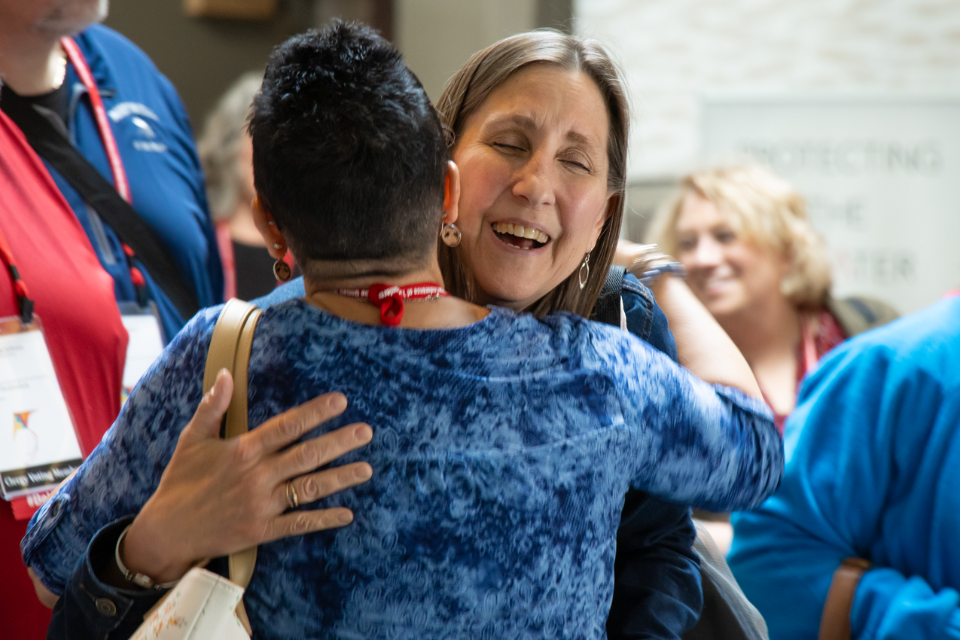On the heels of a historic General Conference, United Methodists embrace a fearless spirit of renewed mission and ministry at the 2024 Michigan Annual Conference.
JAMES DEATON
Content Editor
ACME, Mich. — Over 1,500 United Methodists met May 30 – June 1, 2024, for the sixth session of the Michigan Annual Conference at the Grand Traverse Resort and Spa outside Traverse City.
This year’s gathering comes just a month after the historic 2024 General Conference, during which major decisions were made that set The United Methodist Church on a new path. Matters related to LGBTQ+ inclusion passed, and steps toward worldwide regionalization will allow the church to live into its diversity.
The conference theme, “Fearless: Embracing a New Future,” was based on 1 John 3:2 and Isaiah 41:10 and became a focal point as 1,152 clergy and lay members, along with staff and guests, brought a fearless spirit of rebirth and reenergized passion for mission and ministry.
Bishop David Alan Bard, presiding bishop of the Michigan Conference, pointed to this spirit in his State of the Conference report (click to read) as he called members to settle into the space The United Methodist Church finds itself in post-disaffiliation and post-General Conference.
“We are at an inflection point,” said Bishop Bard, “and it is time for us to refocus our energy and attention on the ministry to which we are called in Jesus Christ . . . . It is time for us to reclaim our Wesleyan way of being followers of Jesus. It is time to renew our lives in Christ, renew ourselves in God’s Spirit.”
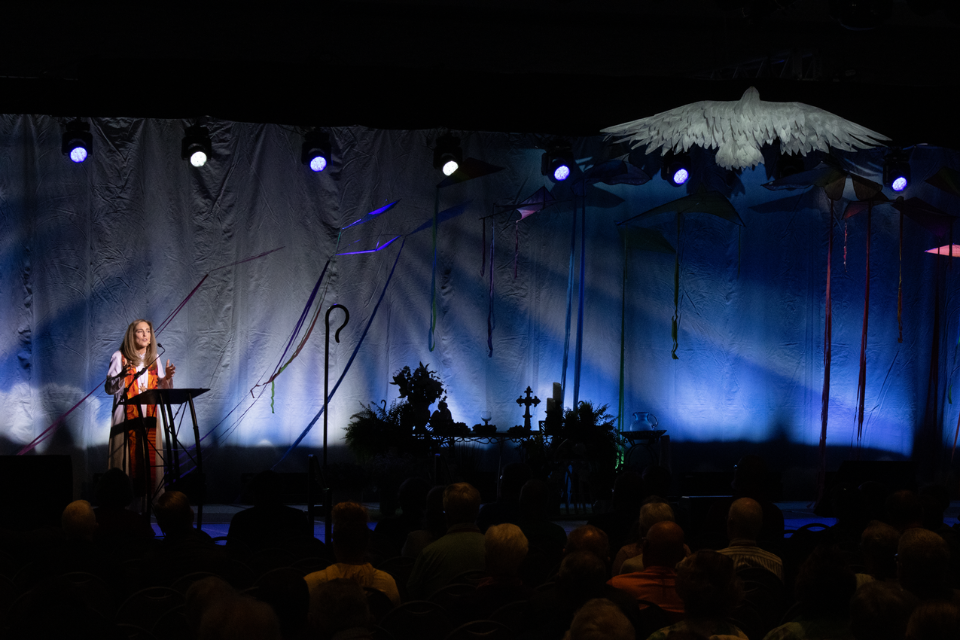
Rev. Ginger Gaines-Cirelli, the conference’s guest teacher and preacher, encouraged her listeners to catch this passion for renewed ministry that she already sees in The United Methodist Church. Gaines-Cirelli is the senior pastor of Foundry UMC in Washington, D.C. In her sermon on Saturday morning (click to read), she likened the denomination’s current state to a fresh expression of Pentecostal fire.
“[The Holy Spirit] is setting off alarms, waking people up, stirring discomfort, disrupting what has been, creating confusion and concern, leading people into new configurations of community, inspiring boundary-crossings among persons used to dwelling in discrete tribes, and empowering once timid Jesus followers and justice-seekers to stand up, to take a risk, to speak out about the love and grace of God and the imperative for inclusion and justice in the church.”
Personal Reflections on the Church’s Rebirth
The desire for The United Methodist Church to move forward, coupled with a genuine excitement for the future, felt by our General Conference delegates in Charlotte, N.C., was also felt during Annual Conference. Reflecting on their experience at Annual Conference, lay and clergy members commented on the change in tone from previous years.
Rev. Jeremy Africa, pastor at Otsego UMC, noted, “I’ve appreciated the spirit here. Through General Conference, the church has sought to be inclusive of all — everyone from the traditional side of the church to the progressive side of the church — and I appreciate that. It seems like that’s what we’re striving to be. I know it’s going to take some living into, but I appreciate that.”
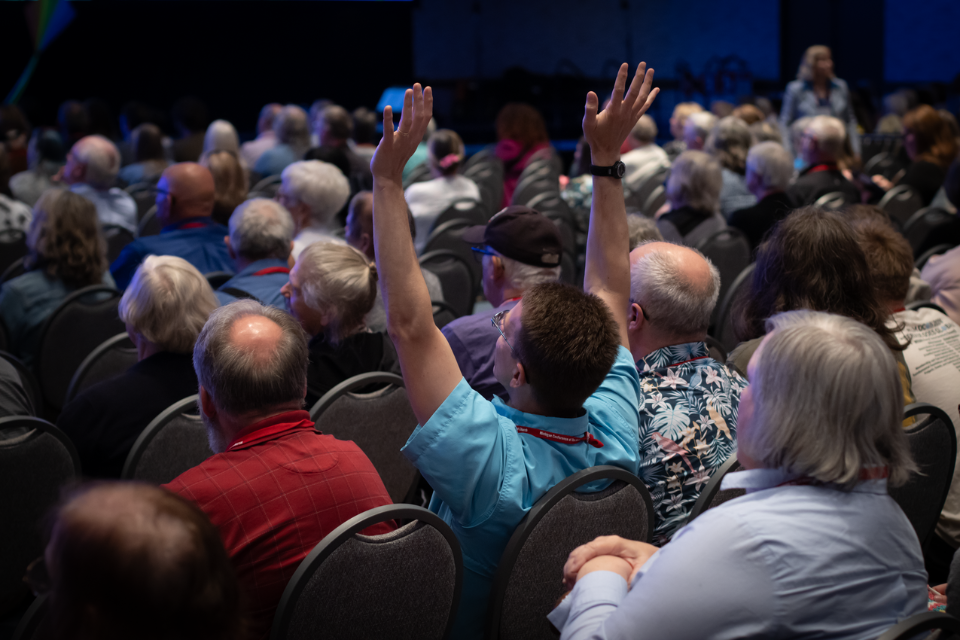
This was Andrea Alford’s first Annual Conference. She is a lay member from Chelsea: First UMC and was excited to be invited by her church to participate, given where the denomination is right now following General Conference. “My family participated full-heartedly in all the discussions about how to move forward and become more inclusive. The words in the Book of Discipline have been edited, and we can embrace them. We can now ask how each of our churches and communities can really live into what all this means.”
Cindy Jones, laity from Flint: Hope UMC, said this was her second Annual Conference and feels optimistic about where The United Methodist Church is heading. “I like the direction we’re going. I think it’s wonderful that the church is recognizing the LGBTQ community. I’m really thankful that the legislation passed at General Conference. I’m also really into community outreach, so I like that the Michigan Conference is helping people in other parts of the world like Haiti.”
Pastor Anika-Kafi Summers, currently serving Garden City UMC, felt the church, hurt by disaffiliation, has been stuck in how to move forward. “Stopping the victim mentality is what we’ve needed,” she explained, “and now we can say why we’re here. We’re going to uplift and reimagine what it means to be evangelical, rabble-rousing Methodists, just like John Wesley.”
Fearless Mission and Ministry in Michigan
In his opening sermon on Thursday afternoon, entitled “Pantophobia” (click to read), Bishop David Bard laid the spiritual framework for the ministry storytelling and engagement that would be highlighted during the rest of the conference. Facing the future of The United Methodist Church in Michigan, we must trust God and lean into fearlessness, said the bishop.
“When we lean into fearlessness, lean into adventure and adaptability, we create churches that are willing to experiment, try new things, look honestly at the enormous challenges of the world, and trust that in the wisdom of God, we can make a way. . . . And this is only a beginning. What we shall be is still emerging, and you ain’t seen nothing yet.”
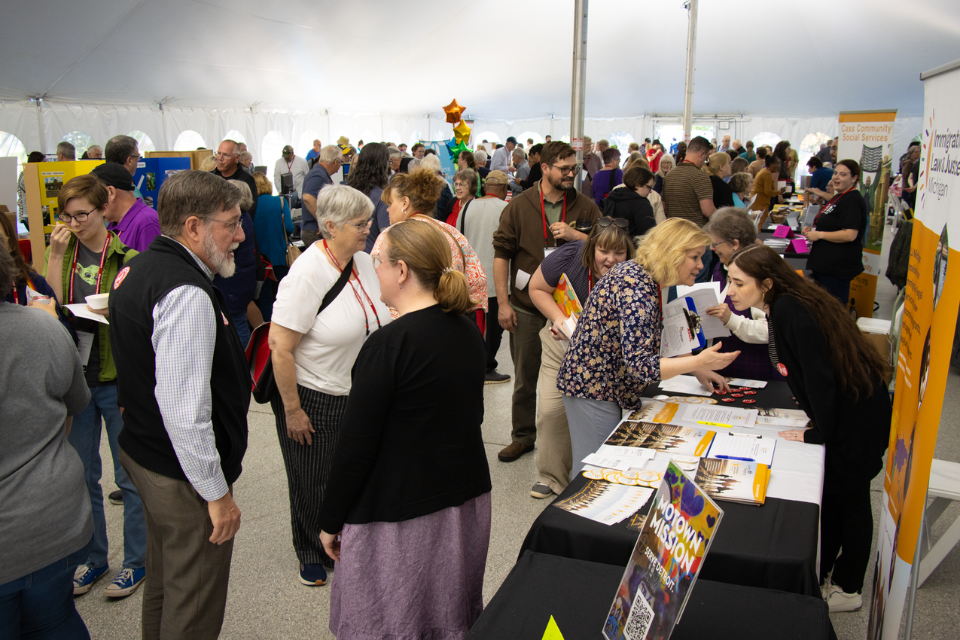
Examples of United Methodists living out fearless ministry, trying new things, and taking the good news of the gospel into the world gave flesh-and-blood evidence of a church taking its call seriously.
This started Thursday morning when partner Midwest Mission hosted a Rice Meal Pack event for the second year. In assembly-line fashion, teams of volunteers packed simple, nutritious meals for those in need. Exceeding last year’s involvement, over 150 United Methodist volunteers put together 6,500 rice meal packs. Each pack provides six meals, with 39,000 meals being sent worldwide. Generous donations from United Methodists totaling $13,000 purchased supplies for the event.
The excitement of a church reenergizing for mission and ministry continued at the well-attended Mission Festival on Thursday evening, featuring some 40 EngageMI Mission Partners from all over the world, to four sessions focused on inspiring stories of bold new ministries.
Conference Lay Leader Annette Erbes spoke with Rev. Ginger Gaines-Cirelli, this year’s Annual Conference guest speaker, during the Laity Perspective on Thursday afternoon. “My laity inspire me the most,” said Gaines Cirelli, as she described how lay persons in her congregation bravely take on new roles and say yes when they don’t have all the answers. She called it “faithful fearlessness.”
Gaines-Cirelli offered a prayer she has found foundational personally: “God help me to trust you more than I distrust myself.” Those words from scripture have helped both her and her congregation “in an ever-deepening journey to lean more and more into God’s liberating love.” Gaines-Cirelli listed several impediments to fearlessness, including distrust in God, worry about failing and backlash, and a failure to understand oneself as a beloved child of God. She encouraged those present to pray and study “what holds you hostage” to fear.
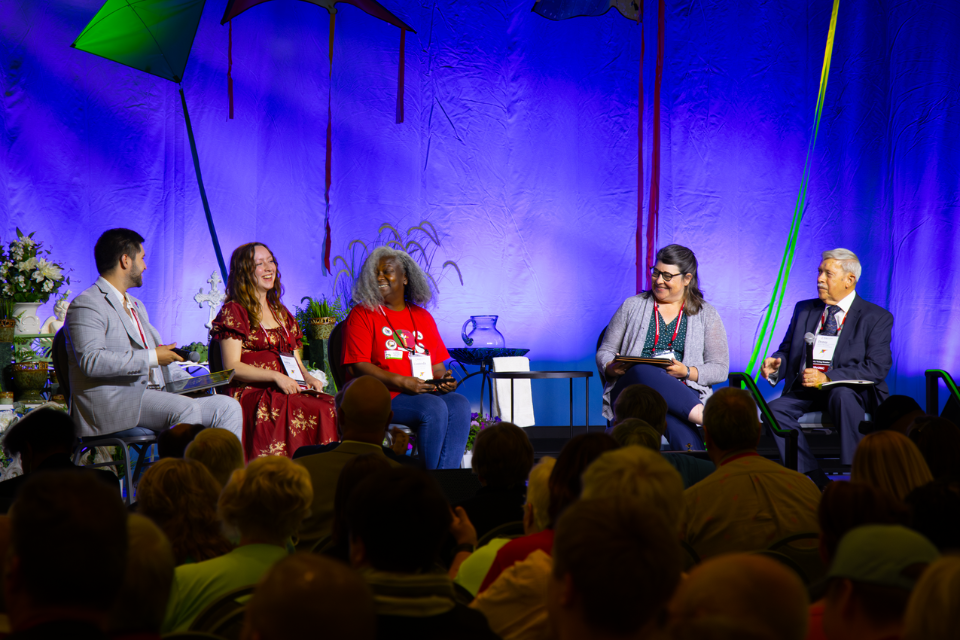
Liz Carr, lay member of the Commission on the Annual Conference Session, and Denny Wissinger, member of the Board of Laity, then talked with recipients of resource and training grants given annually by the Board of Laity.
Jacob Stone and Audra Hudson were helped to attend an Eco-School in Greece sponsored by the World Council of Churches. They were the only United Methodists attending this school and returned to Michigan with enthusiasm to form an Environmental Justice Task Force. They believe Michiganders care deeply about God’s creation, and the Michigan Conference is poised to become a leader in environmental justice among United Methodist annual conferences. The pair has offered workshops and plans to continue resourcing churches in Michigan. To others considering bold ministry, they say, “Just go for it! Don’t be afraid to fail.”
Contreda Navarro-Jewell, a member of Southfield: Hope UMC, reported on her ministry, Healing through Art Therapy and the Word of God. She hosts this ministry as a safe place for people in the community to experience healing through the interplay of art and scripture. Navarro-Jewell talked about how she tells participants, “Let’s deal with this hurt, mistrust, betrayal, whatever it may be. Let’s talk about it and see what it looks like from your perspective on paper. You’re not here by mistake. You’re here for a reason.” For one of the coloring exercises, she used Jeremiah 29:11, a powerful reminder that God has a plan for our lives. She encouraged conference members to step out and not be afraid as they think through new ministry ideas they may have: “God has his hand on you for something special.”
Three engagements on Friday and Saturday provided further examples of fearless mission and ministry in the Michigan Conference related to innovation, discipleship, and outreach. Rev. Jennie Browne, Clergy Assistant to the Bishop and Director of Connectional Ministry, hosted all three sessions. Following each one, conference members broke into small groups to discuss the implications of what was presented.
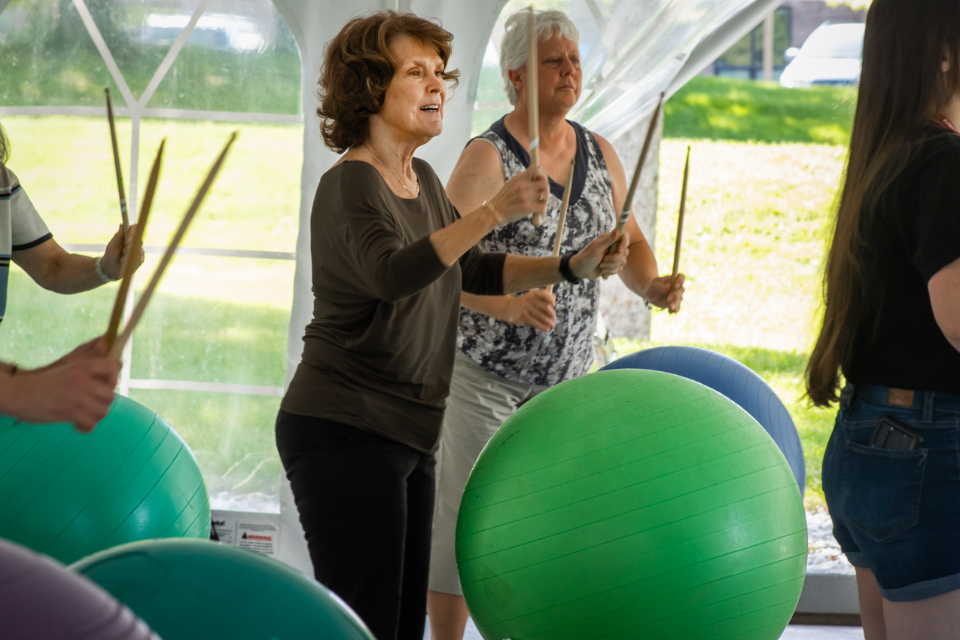
The first session on Friday afternoon focused on innovation and began with a video about Stage One (watch and download video). Lansing: Asbury UMC was adopted by Sycamore Creek Church and transformed into a performing arts center currently used by three local theater companies. Startup food businesses also use its kitchen. Pastor Tom Arthur said of the creation of Stage One, “Visioning is a kind of a puzzle with pieces put together in different ways.” He added, “When you have more pieces on the table, that builds more relationships.” Arthur explained that Sycamore Creek uses its resources “to build more community.”
Browne then interviewed Rev. Andy Lee, pastor of Commerce UMC. Lee talked about his church’s Tuesday evening basketball game, which began as outreach to the men in younger families who “were having a hard time connecting.” The ministry evolved into more than a sports event and began drawing men from other communities as word spread. Some committed to driving 30-45 minutes to play. Pastor and congregation became increasingly intentional about inviting new participants. The opportunity for free basketball brought in “an unexpected and diverse group of guys. We approach each person with respect, curiosity, and a heart of welcome,” Lee reported.
Saturday morning’s session on discipleship began with a video featuring a Lenten book study sponsored by Dowagiac: First UMC at a local library (watch and download video). Led by their pastor, Rev. Chris Momany, the study became a way for their church to share United Methodist faith values like love, acceptance, and advocating for the dignity of all. The study drew community members and library employees and led people to join the church. Encouraging churches to reach beyond their walls, Momany said, “Find what needs to be done and do it for Jesus and the kingdom.”
Browne then interviewed Rev. April Gutierrez about her role on the task force that created the online Anti-Bias/Anti-Racism Education & Training curriculum required for all pastoral appointments in Michigan. Gutierrez spoke about how she and the task force dreamed big and fearlessly created a customized rooted in Wesleyan principles for Michigan churches to learn and grow together in faith in building beloved community. Thinking on her work developing one of the training modules, she encouraged United Methodist clergy to think, “What if all appointments are cross-cultural?” She said we should not assume we have the same story or background. We should think about the differences between us and “approach one another with wonder and curiosity.”
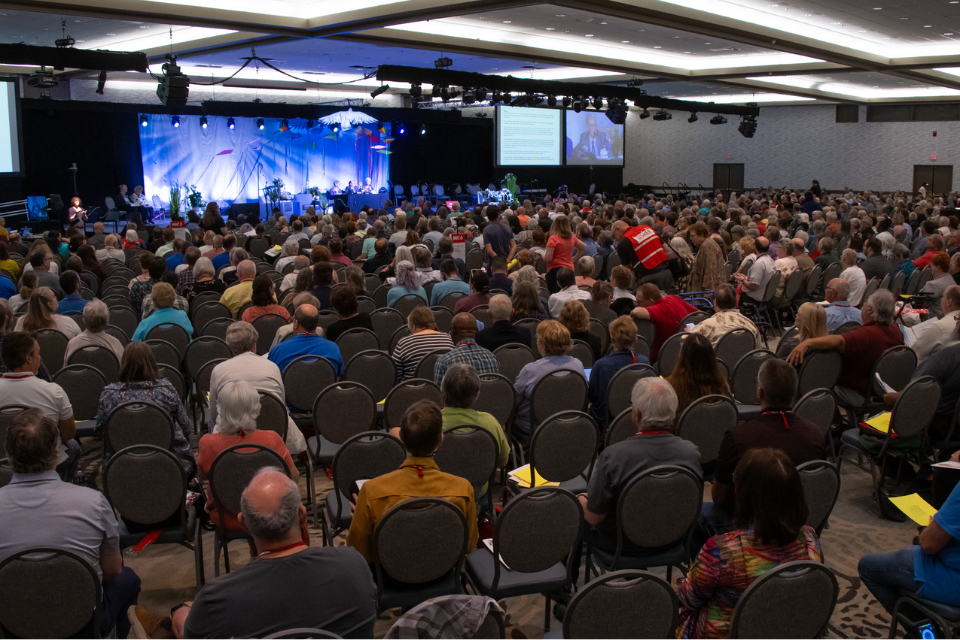
On Saturday afternoon, fearless outreach ministries were highlighted. A video summarized Advocacy Day 2024 (watch and download video), where 250 United Methodists and friends journeyed to the State Capitol to fearlessly share their personal stories with state legislators and champion mental health care access for all Michiganders.
A second video featured the Sugar Crash summer outreach program out of Centro Familiar Cristiano UMC in Melvindale, near Detroit (watch and download video). This VBS-style offering welcomes immigrant children and asylum seekers from Spanish-speaking countries with a safe space to play, dream, and do Bible study. The ministry has grown to serve 100 children and now provides each child with a new pair of tennis shoes and a backpack of school supplies.
Randy Hildebrant, the Church and Community Worker at God’s Country Community Workers in the Upper Peninsula, was interviewed by Browne about this vital rural ministry. Hildebrant explained how the ministry hears about a need in their area, such as the rise in domestic violence, and finds out how to address it. They are now converting a house gifted to them into a temporary shelter for women and children. He noted his ministry has a motto, “Bend, but don’t break,” which gives them flexibility as they live into fearless ministry.
Support and Celebration of Fearless Ministry
Several offerings were received throughout the 2024 Michigan Annual as a reminder of the generosity of Michigan United Methodists, particularly as it relates to supporting and celebrating fearless mission and ministry.
During the opening worship service, a $36,029 offering was collected (donations continue to be accepted through this secure link). Haitian Assets for Peace International (HAPI) will receive 45% of the total offering, and the Bishop Judith Craig Children’s Village in Liberia will also receive 45%. Bishop Bard has also designated a 10% tithe of the offering to go to Water for Life (watch and download video). These General Advance Projects are Step 4 EngageMI Ministry Partners, vital initiatives supported by the Michigan Conference.
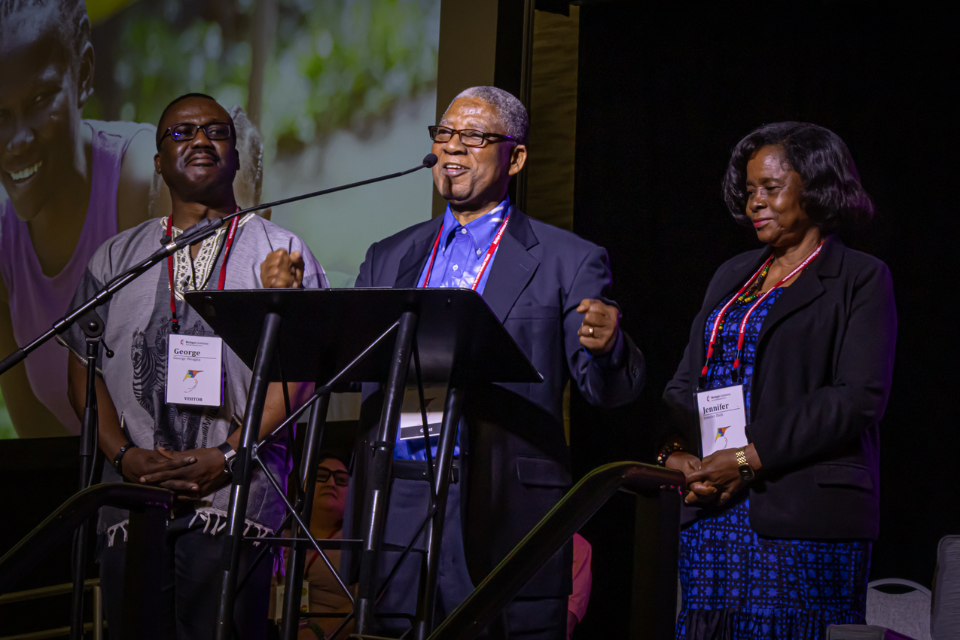
A separate offering of $3,209 was received for the Ministerial Education Fund (MEF), which will provide funds to assist seminary students with educational expenses (donations continue to be accepted through this secure link).
On Saturday, during the final plenary session, Lisa Batten and Rev. Jon Reynolds, co-chairs, gave a final report on the Michigan Conference’s Readers to Leaders fundraising campaign. They announced that 250 Michigan churches gave over $320,000 to Readers to Leaders, benefiting 100 students at United Methodist schools in Liberia and 250 at the Michigan Conference’s Children’s Defense Fund Freedom Schools. Information on how individuals can still give is found on this web page.
As part of an Annual Conference initiative to get people moving and motivated to better care for their health, the “Zero-K – Move to End Child Hunger” on Thursday raised money to fight child hunger in Michigan. Approximately $4,000 was raised, and more funds are expected to come in (donations continue to be accepted through this secure link). There was a traditional 5K held on Thursday morning, but conference attendees were encouraged to participate in whatever ways they were able, whether it was walking, chair yoga, cardio drumming, or other activities offered.
Four special awards were given as part of the 2024 Michigan Annual Conference:
-
- Harry Denman Award for Evangelism—Pastor Matt West and Rev. Rodney Gasaway. The Harry Denman Evangelism Award program honors United Methodists in each annual conference who have shown a passion and fruit for evangelism.
- One Matters Award—Grace UMC in Lansing and Rev. Leslee Fritz. Discipleship Ministries presents this award to the pastor and lay leaders of a congregation that has done significant work to grow their ministry, turning zeros from previous years into positive numbers.
- Francis Asbury Award—Connie Swinger. The award recognizes United Methodists who have made a significant contribution to fostering United Methodist ministries in higher education at the local, district, or annual conference level. It is awarded annually to one honoree per annual conference.
- John Buxton Award—Andy Wayne. The John Buxton Award honors creative problem-solving in our annual conference.
Clergy were inspired and affirmed during the Service of Recognition, Commissioning, and Ordination on Friday evening (click to view worship booklet and complete list of names with bios). Rev. Lillian Daniel, Conference Minister for the Michigan Conference of The United Church of Christ, was this year’s ecumenical representative and addressed those being celebrated.
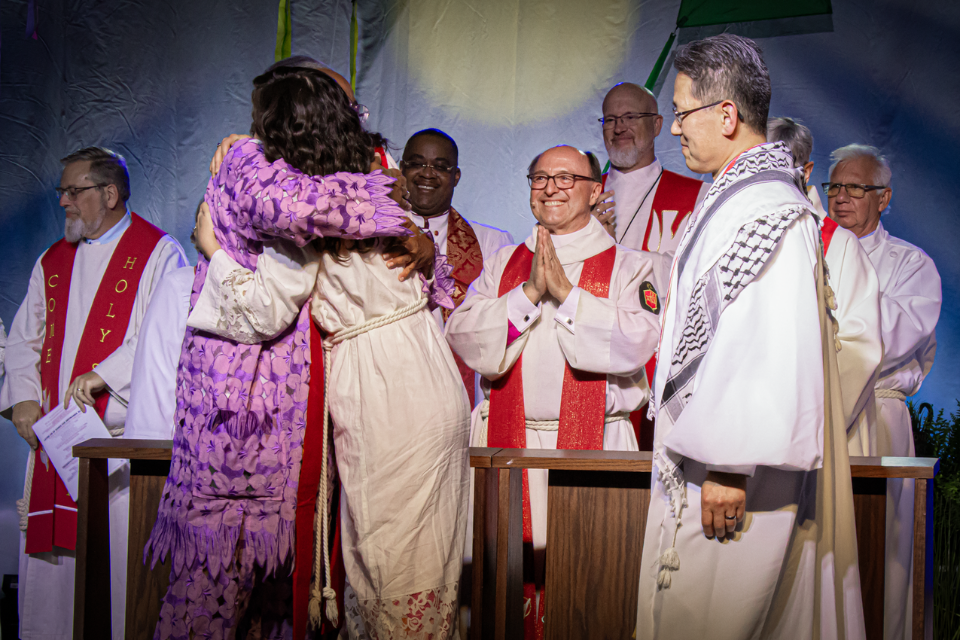
In his sermon (click to read), Bishop Bard challenged those preparing for set-apart ministry to nurture their relationship with Jesus Christ and deepen four qualities in their hearts, minds, souls, and lives: courage, honesty, humility, and love. With these things, he continued, “we offer the gifts we have to give . . . [and] when we do that well, what we shall be will emerge. The beauty God intends for our lives and our churches will begin to sprout, to blossom, to bloom.”
During the service, seven were ordained (six elders, one deacon), eight were commissioned (six elders, two deacons), one elder was received into provisional membership, three elders in full connection were recognized or transferred, and three graduated from Course of Study (click to view complete list).
During the clergy retirement session on Wednesday evening, 40 retirees (click to see full list) were recognized for their service in the Michigan Conference on behalf of Christ’s church. One of these was a conference staff member recognized during conference proceedings: Rev. Dirk Elliott, Director of Congregational Vibrancy and Leadership Development.
Business Guides Mission and Ministry
Diane Brown, Legislative Coordinator for the Michigan Conference, guided voting members through the various resolutions submitted for consideration. There were ten annual conference resolutions, in addition to a list of amendments included in the legislative committee report (view report). One resolution originally submitted, R#2024-8, “Condemning Apartheid in Palestine and Israel,” was not brought to members for a vote.
Two legislative items were on the consent calendar, which means they passed by nine-tenths of the legislative committee and then were passed by voting members during the first plenary session on Thursday afternoon. These resolutions were R#2024-4, “Create an Exploratory Campus Ministry Fund Task Force,” and R#2024-5, “Commitment to the People of Haiti.”
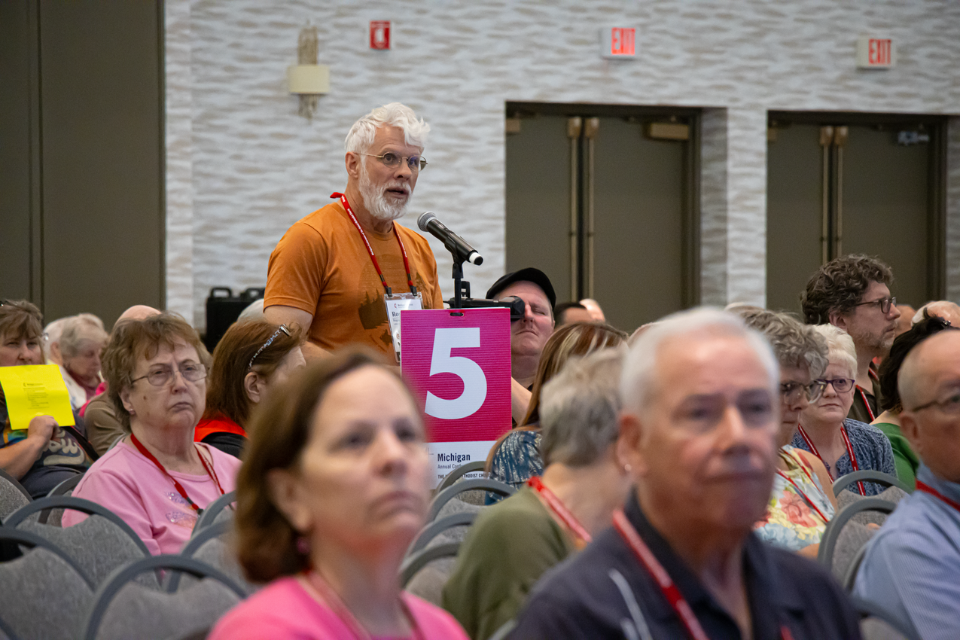
The 2024 Michigan Annual Conference approved the remaining eight pieces of legislation during the plenary sessions:
-
- Three dealt with topics related to salaries and benefits. Two resolutions (R#2024-1 and R#2024-2) came from the Michigan Conference Board of Pension and Health Benefits related to the Past Service Rate for the Ministers’ Reserve Pension Fund and the Housing/Rental Allowance for retired or clergy on medical leave status receiving disability benefits. One resolution (R#2024-10) from the Commission on Equitable Compensation dealt with the 2025 Minimum Salary Schedule.
- R#2024-3, “Policy for the Protection of Children, Youth, and Vulnerable Adults,” was submitted by the Protection Policy Task Force. The policy applies to all clergy, lay, staff, or volunteers within district or conference-related activities or events who have direct or indirect contact with children, youth, or vulnerable adults. It does not apply to local churches. The policy sets forth minimum requirements for screening and training.
- Two resolutions related to Israel and Palestine were debated on Saturday afternoon. R#2024-6, “A Call for Peace with Justice in the Middle East” was adopted, but R#2024-7, “A Call for Two States in Israel and Palestine” was not adopted. At the end of voting, Bishop Bard noted, “You have demonstrated what it’s like to talk about tough things together as a community of faith.”
- R#2024-9, “Witnessing and Voting for Civility, Compassion, and Democracy in 2024,” passed with amendments. In presenting the resolution, Rev. Rich Peacock said, “Folks can register to vote at mi.gov/vote. People can support get-out-the-vote efforts with organizations such as the Detroit NAACP project, ‘Take Your Soles to the Polls.’”
- A final resolution, R#2024-11: Update on Training for Active Clergy, Conference Staff, and District Staff,” was adopted. This resolution provided an update on the Anti-Bias/Anti-Racism Education & Training online curriculum. This training is required of all persons serving under appointment or assignment in the Michigan Conference, in addition to conference staff. The deadline for completing at least one module of the Anti-Bias/Anti-Racism Education & Training online curriculum has been extended to December 31, 2024. A second module must be completed by December 31, 2025. In response to questions from the floor, Bishop David Bard encouraged the conference to do this work together, for the world is changing, and we need deeper intercultural competence. He also noted that there will be consequences for those who refuse to follow through. Appointments may be reconsidered, and conference staff may be involved at some point.
In General Conference-related business, members heard a report from the Michigan Conference’s delegation on Friday morning. Co-chairs Laura Witkowski and Rev. Paul Perez summarized the passing of major legislation (read news summary).
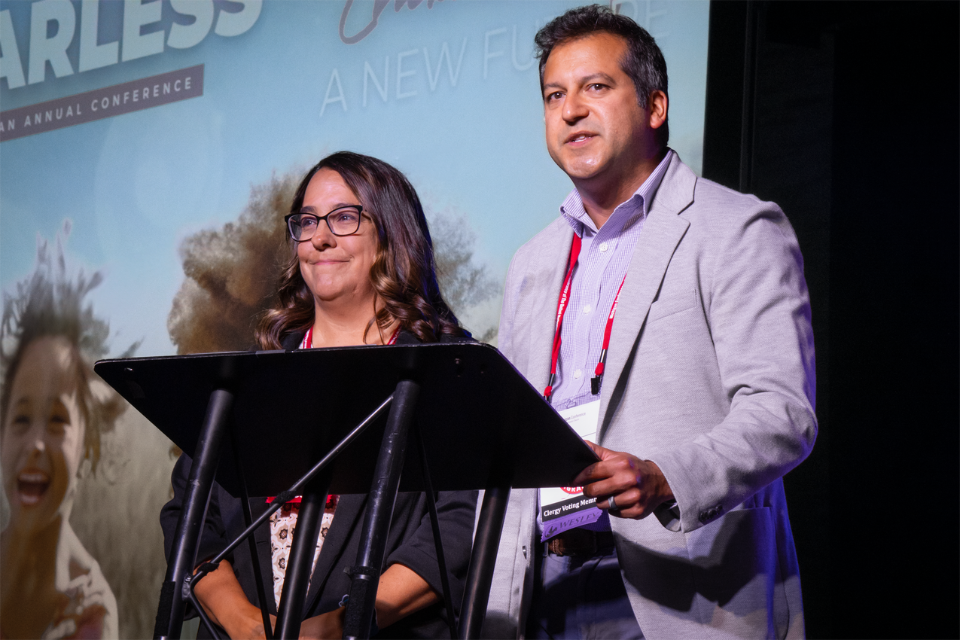
They explained that the delegation’s work will continue in the coming year as they prepare for the upcoming North Central Jurisdictional Conference, set for July 10-13, 2024, and begin educating the conference on several UMC constitutional amendments, which will be voted on at next year’s Annual Conference. Also, they stated that conference members will soon be able to offer feedback on a draft of a General Book of Discipline, which is part of the regionalization plan approved at General Conference.
The delegation presented a resolution related to gathering a pool of nominees from the Michigan Conference to be considered to serve on one of The United Methodist Church’s general boards or agencies. The resolution passed, allowing the delegation, in collaboration with Bishop David Bard, the director of connectional ministries, and the officers of the Conference Leadership Council, to ask those interested in being part of a diverse pool of Michigan Conference nominees to send their names for consideration. (Interested persons should complete this online form by June 21, 2024.)
Rev. Leslee Fritz, president of the Michigan Conference Council on Finance and Administration, and Andy Wayne, a lay council member, presented the 2025 Annual Budget (click to read and download), an 8.4% decrease from 2024, for approval. Conference members approved an overall conference budget of $8,493,144 for 2025.
Reflecting on the painful budget reduction of 20.1% last year, Wayne spoke about the challenge of balancing the needs of doing conference and general church connectional ministry with the needs of local churches. The slight reduction in Ministry Shares due in 2025 will bring much-needed relief to local churches. “Let’s be fearless with the dollars we have,” said Wayne.
Two budget items of note: The Episcopal Fund required in general church apportionments has increased, given the increasing number of bishops in Africa. The fund pays for the staffing of episcopal offices, not just the salaries of bishops. Also, the Conference Leadership Council line item used to include the area of camping but no longer does.
Following the passing of the budget, Bishop Bard said that the Michigan Conference must do better with submitting their Ministry Shares. The return rate for churches was 73% in 2023. “As a conference, we cannot spend money we do not receive. . . . We hear conversations about priorities for mission, and we want to be able to fund those even more adequately than we do now.”
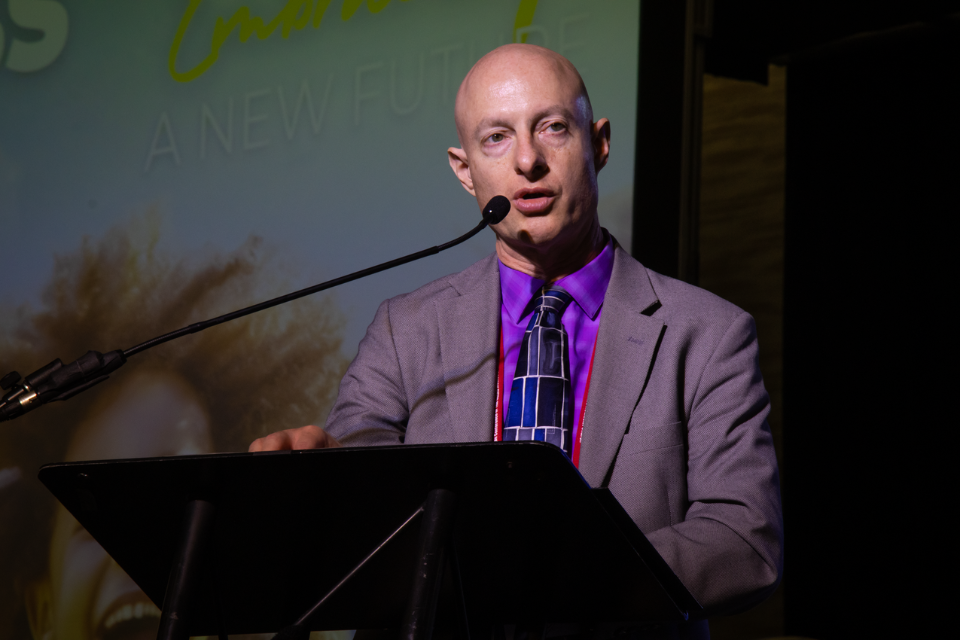
During the corporate business session on Friday, Rev. Carolin Spragg and Matt DeLong, co-chairs of the Board of Trustees, reported that the season of disaffiliation is over, and only a couple of churches have yet to finalize all the requirements.
Even though disaffiliation, as outlined in the Book of Discipline, has ended, Bishop Bard explained in his State of the Conference report (click to read) that he is working with staff and the Board of Trustees on two policies. He said that the United Methodist Church has become more spacious, but some congregations feel this space is too foreign and don’t see a way forward. To address this, the first policy on Covenantal Closings will allow for the departure through the closure of a congregation and enable it to continue as a different church. The second policy would provide a way for churches that left and may want to reaffiliate with the Michigan Conference. More details on both policies are forthcoming.
Returning to Friday’s corporate session, Rev. Margie Crawford, Dean of the Cabinet, presented the names and stories of the five churches that have closed since the last annual conference session, and members voted to accept their closure. The list of five closed churches includes Charlevoix UMC (Northern Skies District), Leonard UMC (East Winds District), Oshtemo: LifeSpring UMC (Greater Southwest District), Rodney UMC (Central Bay District), and Forester UMC (East Winds District).
Annual Conference Statistics for 2023
The official statistical report from Pamela Stewart, Conference Statistician, noted that all categories were down in relation to 2022.
Statistics for worship attendance include in-person and virtual/online worship. The General Council on Finance and Administration started collecting virtual attendance in 2020.
-
- Membership in 2023 was 90,671, down 10,988 or 11% from 2022
- Average Worship Attendance in 2023 was 66,568, down 8,043 or 11% from 2022
- Sunday School Attendance in 2023 was 6,325, down 1,412 or 18% from 2022
- Professions of Faith in 2023 were 1,184, down 119 or 9% from 2022
- Adults/young adults in small groups in 2023 numbered 21,396, down 1,699 or 7% from 2022
- Mission Engagement in 2023 was 25,488, down 598 or 2% from 2022
Last Updated on June 11, 2024

